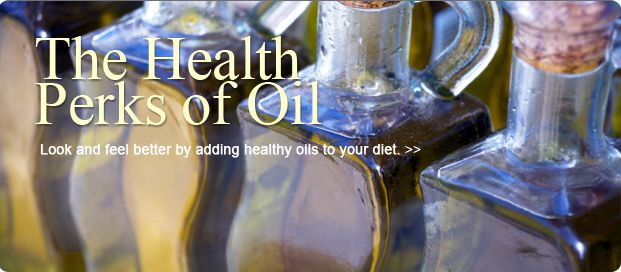
You’ve heard it a million times: Fat is bad for you. But the reality is, only some fats-as in, trans and saturated fats-negatively affect your health. Two other types of fats-monounsaturated and polyunsaturated-can actually improve your health by lowering your LDL or “bad” cholesterol levels, helping your body absorb vitamins and even preventing certain eye problems. Of course, nobody’s saying to start swigging olive oil (even healthy oils come with their fair share of calories), but adding small doses to your diet has its health benefits. Here’s what to stock up on.
Olive Oil
Can salad dressing save your life? Well, no, but drizzling two tablespoons of olive oil over your greens might reduce your risk of heart disease, according to the Food and Drug Administration. Opt for extra-virgin or virgin varieties, since they’re less processed and therefore make a smarter addition to a heart healthy diet. And it’s not just the heart-researchers from the University of Granada and the University of Barcelona found that olive skins might help prevent colon cancer, and another Spanish study published in BMC Cancer suggests that extra-virgin olive oil can cut the risk of certain breast cancers.
Fish Oil
Another key component of a heart healthy diet is fish oil, which contains omega-3 fatty acids that may decrease the risk of heart disease, a heart attack and abnormal heart rhythms. Research also shows that fish oil may lower blood pressure slightly as well. And the benefits of fish oil don’t end there-two separate studies found that fish oil can also help eye problems. The first study, done by the Association for Research in Vision and Ophthalmology, discovered that fish oil actually from fish (as in, not capsule form) can prevent what’s called “age-related macular degeneration”-blurred vision that gets worse with time (it can also lead to blindness). The second study, by researchers at Harvard’s Schepens Eye Research Institute, showed that fish oil protects against dry eye syndrome where the body doesn’t produce enough tears. Their suggestion? Eat tuna.
Flaxseed Oil
According to ongoing research, flaxseed may aid in preventing hormone-related cancers (breast, prostate, colon) and heart disease, improving blood sugar levels, decreasing the number of hot flashes associated with menopause and even warding off arthritis and asthma when used as an anti-inflammatory. More scientific evidence is needed in order to say for certain whether or not flaxseed works in these ways, but taken in small doses, it can't hurt to add it to your heart healthy diet. Another tip: Taking flaxseed in capsule form or adding it to your daily menu can also lead to healthier hair and skin.
Walnut Oil
Walnuts share some of health benefits as fish oil by also supplying the body with omega-3 fatty acids, according to a new study out of Yale University. So what's the difference? A study published in the American Journal of Clinical Nutrition this past May found that walnuts lower cholesterol levels while fish oil reduces triglycerides-another type of fat in your blood. The bottom line: Both help the heart.
Canola Oil
Thinking of making stir-fry for dinner? Consider using canola oil, which comes from the seeds of the canola plant. It actually has the least amount of saturated fat than other common cooking oils, including sunflower oil and corn oil, and less than half the saturated fat of olive oil (don't worry-olive oil's still good for you). Similar to the benefits of fish oil, canola may prevent heart problems by lowering blood pressure and cholesterol, as well as reduce inflammation.
Sesame Oil
Much like canola oil, sesame oil-which is frequently used in Asian recipes-may help with inflammation, cholesterol and heart disease. A 2006 study published in the Yale Journal of Biology and Medicine found that when people with high blood pressure swapped all other oils for sesame oil, their blood pressure and body weight decreased after 45 days. Just be sure to take it in small doses, since like other healthy oils, sesame oil still has about 13 grams of fat and 120 calories per tablespoon. Looking for a beauty tip? Sesame oil is also packed with the antioxidant vitamin E and may improve some types of skin irritation.



































